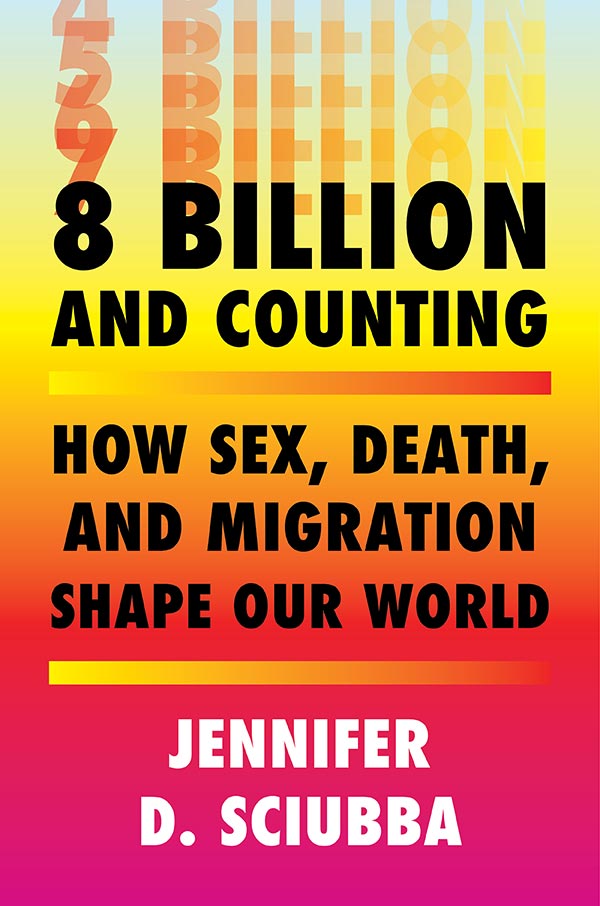As the world nears 8 billion people, the countries that have led the global order since World War II are becoming the most aged societies in human history. At the same time, the world’s poorest and least powerful countries are suffocating under an imbalance of population and resources. In 8 Billion and Counting, political demographer Jennifer D. Sciubba argues that the story of the twenty-first century is less a story about exponential population growth, as the previous century was, than it is a story about differential growth — marked by a stark divide between the world’s richest and poorest countries.
Drawing from decades of research, policy experience, and teaching, Sciubba employs stories and statistics to explain how demographic trends, like age structure and ethnic composition, are crucial signposts for future violence and peace, repression and democracy, poverty and prosperity. Although we have a diverse global population, demographic trends often follow predictable patterns that can help professionals across the corporate, nonprofit, government, and military sectors understand the global strategic environment.
Through the lenses of national security, global health, and economics, Sciubba demonstrates the pitfalls of taking population numbers at face value and extrapolating from there. Instead, she argues, we must look at the forces in a society that amplify demographic trends and the forces that dilute them, particularly political institutions, or the rules of the game. She shows that the most important skills in demographic analysis are naming and being aware of your preferences, rethinking assumptions, and asking the right questions.
Provocative and engrossing, 8 Billion and Counting is required reading for business leaders, policy makers, and anyone eager to anticipate political, economic, and social risks and opportunities. A deeper understanding of fertility, mortality, and migration promises to point toward the investments we need to make today to shape the future we want tomorrow.
Jennifer Sciubba is an associate professor of International Studies at Rhodes College. She is a former demographics consultant to the United States Department of Defense and the author of 8 Billion and Counting and The Future Faces of War.
Shermer and Sciubba discuss:
- Russia and Ukraine: what are the prospects for global security?
- Putin’s MO: is he a savvy chess player or a deranged madman?
- Will the outcasting of Russia work to reverse Putin’s revanchism?
- Could the conflict escalate from armed conflict between Russia and Ukraine to NATO and the U.S. and result in the use of tactical nuclear weapons and in the end global thermonuclear war?
- Why can’t Russians rise up and overthrow Putin?
- What is political demography and how would are those tools applied to the future of global security in the teeth of Russian aggression?
- migrations and the humanitarian crisis in Ukraine (and Syria, Somalia, etc.)
- Is demography destiny?
- Paul Ehrlich’s Population Bomb doomsday predictions: “The battle to feed all of humanity is over. In the 1970s hundreds of millions of people will starve to death in spite of any crash programs embarked upon now. At this late date nothing can prevent a substantial increase in the world death rate.”
- Paul Ehrlich’s wager with Julian Simon over resources
- How many people have ever lived on Earth?
- How many people can Earth sustain? What is the carrying capacity of Earth?
- At 8 billion and counting, will we peak at 9, 10, or 11? When?
- How do we know how many people live in every country, their ages, etc.? How reliable is that data and what are the error bars?
- what it means to say a country is “old” or “young”
- As medical science and technology advance, how old could people live and how will countries support retirees who live for decades beyond retirement?
- family planning and birth control
- abortion and unwanted pregnancies: how to reduce them
- China’s One-Child policy and its consequences.
The ecologist Garrett Hardin wrote in a highly influential essay in Science, “The freedom to breed is intolerable.”
Worldwatch Institute founder Lester Brown answered in the affirmative his own question asked in a 2012 Scientific American article, “Could food shortages bring down civilization?”
“It is better for all the world, if instead of waiting to execute degenerate offspring for crime, or to let them starve for their imbecility, society can prevent those who are manifestly unfit from continuing their kind.”
The science writer Ronald Bailey tracks neo-Malthusians in his book The End of Doom (St. Martin’s Press, 2015), starting with Paul Ehrlich’s 1968 bestseller The Population Bomb, in which famously proclaimed, “The battle to feed all of humanity is over.” Many doomsayers followed. Worldwatch Institute founder Lester Brown, for example, proclaimed in 1995, “Humanity’s greatest challenge may soon be just making it to the next harvest.” In a 2012 Scientific American article he affirmed his rhetorical question, “Could food shortages bring down civilization?” In a 2013 conference at the University of Vermont Ehrlich assessed our chances of avoiding civilizational collapse at only 10 percent.
The problem with Malthusians, says Bailey, is that they “cannot let go of the simple but clearly wrong idea that human beings are no different than a herd of deer when it comes to reproduction.” Humans are thinking animals. We find solutions—think Norman Borlaug and the Green Revolution. The result is the opposite of what Malthus predicted: the wealthiest nations with the greatest food security have the lowest fertility rates, while the most food insecure countries have the highest fertility rates.
The solution to overpopulation is not to force people to have fewer children. China’s one-child policy showed the futility of that experiment. It is to raise the poorest nations out of poverty through democratic governance, free trade, access to birth control, and the education and economic empowerment of women.
In his book The Evolution of Everything (HarperCollins, 2015) the evolutionary biologist Matt Ridley sums up the policy succinctly: “Better to be cruel to be kind.” The belief that “those in power knew best what was good for the vulnerable and weak” led directly to legal actions based on questionable Malthusian science. The English Poor Laws implemented by Queen Elizabeth I in 1601 to provide food to the poor, for example, were severely curtailed by the Poor Law Amendment Act of 1834, based on Malthusian reasoning that helping the poor only encourages them to have more children and thereby exacerbate poverty. The British government had a similar Malthusian attitude during the Irish potato famine of the 1840s, Ridley notes, reasoning that famine, in the words of the Assistant Secretary to the Treasury Charles Trevelyan, was an “effective mechanism for reducing surplus population.” Later in the century Francis Galton advocated marriage between the fittest individuals (“What nature does blindly, slowly, and ruthlessly man may do providently, quickly and kindly”), followed by a number of prominent socialists such as Sidney and Beatrice Webb, George Bernard Shaw, Havelock Ellis, and H.G. Wells, who openly championed eugenics as a tool of social engineering.
We often think of eugenics and forced sterilization as a right-wing Nazi program implemented in 1930s Germany, but as Princeton University economist Thomas Leonard documents in his book Illiberal Reformers (Princeton University Press, 2016) and the New York Times editor Adam Cohen reminds us in his book Imbeciles (Penguin, 2016), eugenics fever swept America in the early 20th century, culminating in the infamous 1927 Supreme Court case, Buck v. Bell, in which the justices legalized government sterilization of “undesirable” citizens. The court included prominent progressives Louis Brandeis and Oliver Wendell Holmes, Jr., the latter of whom famously ruled, “Three generations of imbeciles are enough.” The result was the sterilization of some 70,000 Americans.
If you enjoy the podcast, please show your support by making a $5 or $10 monthly donation.
This episode was released on March 12, 2022.










